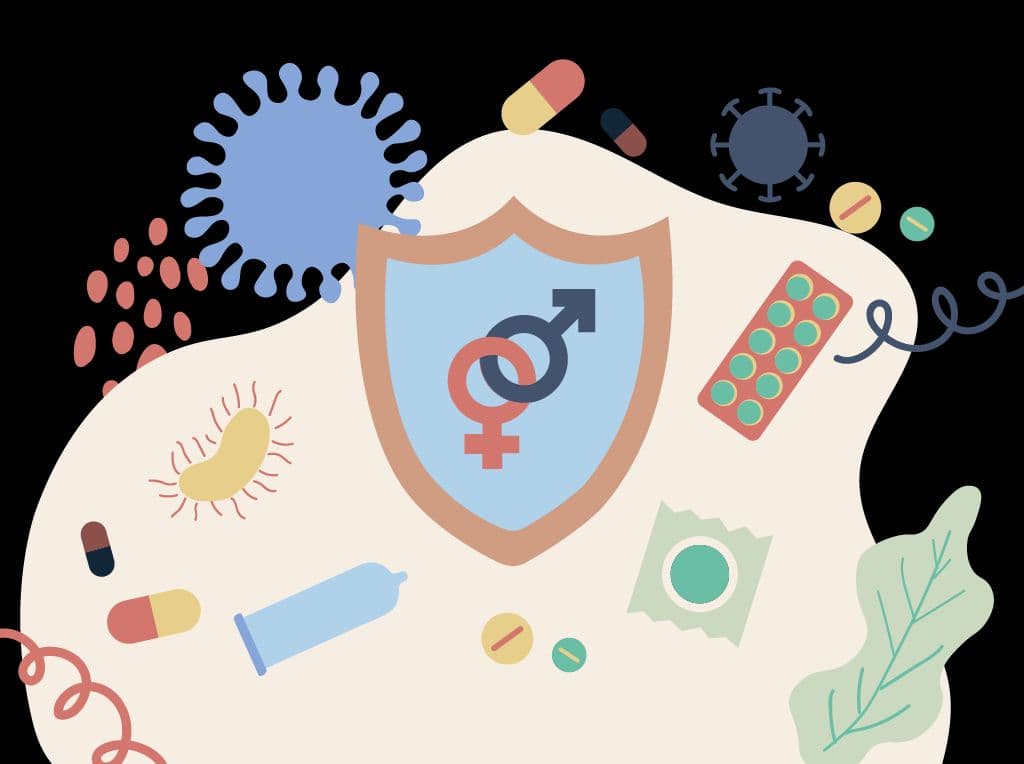Contraceptives or birth controls is methods or devices used to prevent pregnancy. Prevention of unwanted pregnancies reduces abortion rates and women don't have to go through the complications that usually follow after an abortion.
What are the types of contraceptives?
Contraception is of two types:
- Reversible or Temporary contraception - It includes short-acting contraceptives, one-time barrier contraceptives and long-acting reversible contraceptives.
- Permanent contraception
Short acting contraceptives

How it works
These contraceptives release the hormones estrogen and progestin in the body that stops the ovulation process to prevent pregnancy.
Pros
- Extremely effective
- Ensures quick return of fertility
- No interference with future fertility
- No interference with the act of intercourse
- Useful for treating heavy bleeding and irregular cycles
Cons
- Low compliance
- Hormonal side effects like bloating and headache
Barrier contraceptives

How it works
All of these birth control devices and methods work on the principle of creating a sperm ‘barrier’ during sex that prevents the sperms from reaching an egg, thus preventing pregnancy. These cannot be reused, hence they are termed ‘one-time’ barrier contraceptives.
Pros
- No prescription needed, easily available
- Cheaper than other methods of contraception
- To be used only during the act of intercourse
- Condoms also help prevent STIs
- Non latex condoms are a great alternative for those allergic to latex
Cons
- May interfere with the sense of pleasure in physical intimacy.
Long acting reversible contraceptives

How it works
Hormonal implants and injectables stop the ovulation process, thus preventing pregnancy. Copper IUDs stop the sperm from fertilising the egg. Hormonal IUDs adjust the body’s progestin levels which interrupts ovulation and makes the uterus hostile to implantation.
Pros
- Effective for a long period - IUDs are effective for 5-10 years, implants for 1-3 years and injectables for 3 months.
- Effective for spacing in between pregnancies
Cons
- Expensive
- An insertion procedure required
- Hormonal injectables may cause bleeding disorders and weight gain
- Supervision needed for inserting and removing the hormonal implant

Permanent contraception
The permanent method of contraception refers to sterilisation for both males and females. Sterilisation is one of the most common procedures opted by the couple once their family is complete. The Indian Government has made female sterilisation free of cost. In private hospitals, you have to bear the cost of surgery.
How it works
Vasectomy is male sterilisation, wherein the vasa deferentia, i.e. the tubes that carry the semen are cut and ligated. In females, the fallopian tubes that carry the egg from the ovary to the uterus are cut and ligated. This surgical procedure is called tubal ligation.
Pros
- Permanent
- No need to repeat the process like other contraceptive methods
Cons
- You cannot have children in the future. If you wish to, you’ll have to undergo another surgery to reverse the procedure.
- Some women experience menstrual disturbances after tubal ligation.
- Apart from condoms, all other contraception methods increase the risk of ectopic pregnancy.
What are emergency contraceptives?
Emergency contraceptives, also known as the ‘morning-after’ pills, can be used after an act of unprotected intercourse to prevent pregnancy. You need to take them within 72-120 hours of having unprotected sex for it to work.
How it works
Taking the emergency birth control pill makes the uterine cavity hostile for implantation - attachment of the embryo to the uterine lining, thus preventing pregnancy.
Pros
- It is an effective method to prevent unwanted pregnancies.
- It does not interfere with future fertility.
Cons
- Not effective if used after 72 -120 hours
- Disrupts the menstrual cycle
Caution!
As the name suggests, emergency pills should only be used in emergencies. You should not rely on it and have unprotected sex regularly.
What factors decide which contraceptive you must use?
Pre-existing medical diseases : If you have a history of breast cancer, diabetes, hypertension, gallbladder disease, liver disease, migraine or clotting disorder, you cannot use hormonal contraceptives. You can use an IUD but with some precautions.
Age : Hormonal methods of contraception are not suitable for those below 21 years of age. Girls who have never conceived are not recommended for an IUD. Women above 40-45 years of age should not take hormonal pills as it increases the risk of cancer and spontaneous blood clots.
Desire for children : If you wish to have children in the near future, an oral contraceptive pill is a right choice for you. Once you stop them, you can immediately conceive. Do not take hormonal injectables as they delay the return of fertility.
Cost : Some methods are cheap; some are expensive. Hence the decision of which contraceptive you must choose also depends on the amount of money you are willing to spend.
Compliance with taking medicines every day : You have to take oral contraceptive pills every day. If you are forgetful, you should opt for a long-acting reversible contraceptive method.
Multiple sexual partners : In the case of having multiple sexual partners, there is an increased risk of Pelvic Inflammatory Disease (PID) and Sexually Transmitted Infections (STIs). Hence, condoms are advised with another form of contraception to prevent these issues.
Frequency of sexual activity : If a couple has intercourse only once a month, there is no point in taking hormonal pills or other long-acting contraceptives. One-time barrier contraceptives are better for them.
Which contraceptive should you choose if you are having sex for the first time?
You should always use condoms along with other methods to prevent STIs. Oral contraceptive pills are the safest for young menstruators who engage in frequent sexual activity.
Which contraceptive to use if you wish to get pregnant shortly?
If you engage in sexual intercourse very frequently, you can choose a combination of condoms and oral contraceptive pills. Condoms help prevent STIs while the oral contraceptive pills are safe, do not disrupt the menstrual cycle and do not interfere with future fertility.
When should you consult a doctor?
If you miss your periods, have unexpected bleeding, or develop any abnormal signs like pain in the abdomen or foul-smelling discharge after using a particular contraceptive, you must immediately consult your doctor.
Also Read: Part I : Hormonal - Women & Sex: A 360 Degree View of the Contraceptives Landscape
Bottom Line
It is crucial to plan your contraception before having sex for the first time. Visit your gynaecologist to learn about the different contraceptives, and their pros and cons. Depending on various factors, the doctor will advise you on the most suited contraception method for you.
Disclaimer: This information is educational and should not be construed as medical advice. Please consult your doctor before making any dietary changes or adding supplements.
Proactive For Her is a digital clinic for women, offering accessible, personalised, and confidential healthcare solutions. We offer out-patient care, diagnostic services and programs for various health concerns of Indian women, across their lifetime - from puberty to pregnancy to menopause.

